Daniel Koch
Associate professor
Details
Researcher
About me
Daniel Koch is Associate Professor in Urban Design with specialization in Spatial Analysis and docent in Architecture at KTH Architecture; he is also a practicing architect at Patchwork Architecture Laboratory. At KTH, Daniel works in the Urban Design and Urban Theory research area, heading the profile Critical Morphology and Spatial Analysis, where he is involved in several research projects with external funding, supervises PhD-students, and contributes to the research area Applied Urban Design.
Daniel is Programme Director for the Masters' Programme in Sustainable Urban Planning and Design where he also teaches in the introductory course (Sustainable planning and design) and heads the studio course Textures. For the period of October 2024 to June 2026, Daniel also has a special assignment as Deputy Director of First and Second Cycle Education at KTH ABE, with a focus on future development of the ABE 1st and 2nd Cycle educational structure.
Research
Daniel's research investigates the relation between architectural space and social, cultural, and political phenomena, with a focus on spatial relations as an integral part of architecture. The research examines how formations of boundaries, relations, spaces-within-spaces, disjunctions, and heterogeneity performatively situate people and produces social situations, extending into and dependent on social relations and structures. Central to this investigation has been the production of public culture, subjectivity, and the training of aesthetics, as well as how diagrammatic representations of such relations work to drive research and design. Increasingly, this research investigates how these relations and processes are interwoven with the causes and effects of climate challenges, and global justice - and the challenges these questions bring back to the research field, requiring revisions of theoretical and methodlogical positions.
Recent Publications
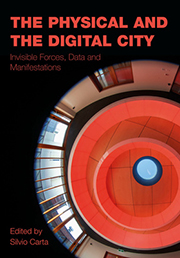 In The Physical and the Digital City: invisible forces, data, and manifestations (ed. Silvio Carta), the chapter "The smart city in the smaller context : Urbanity, data-driven planning, and AI in the context of small data and local conditions," discusses social, cultural, and geographical challenges of digitalisation in contexts where regular digitalisation strategies might not apply, the "smart city" model encounters difficulties, and where demographic change challenges local identities and ways of life. The chapter is an output from the project Duvedmodellen för Lokalsamhällen 2.0 funded by Vinnova.
In The Physical and the Digital City: invisible forces, data, and manifestations (ed. Silvio Carta), the chapter "The smart city in the smaller context : Urbanity, data-driven planning, and AI in the context of small data and local conditions," discusses social, cultural, and geographical challenges of digitalisation in contexts where regular digitalisation strategies might not apply, the "smart city" model encounters difficulties, and where demographic change challenges local identities and ways of life. The chapter is an output from the project Duvedmodellen för Lokalsamhällen 2.0 funded by Vinnova.
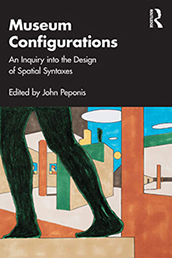 In Museum Configurations (ed. John Peponis), Daniel contributes with the chapter "Narrative, Dramaturgy, and Spatial Choreography", delving into the relation between architecture and movement. utilizing choreographic theory to unpack a more qualitative, embodied, and nuanced conceptualization thereof. Challenging a predominant focus on flows and traces, the discussion includes movement as experience and expression, but also as culturally encoding and part of the negotiation of collective norms - and as individual, collective, and socially and culturally staged for the other.
In Museum Configurations (ed. John Peponis), Daniel contributes with the chapter "Narrative, Dramaturgy, and Spatial Choreography", delving into the relation between architecture and movement. utilizing choreographic theory to unpack a more qualitative, embodied, and nuanced conceptualization thereof. Challenging a predominant focus on flows and traces, the discussion includes movement as experience and expression, but also as culturally encoding and part of the negotiation of collective norms - and as individual, collective, and socially and culturally staged for the other.
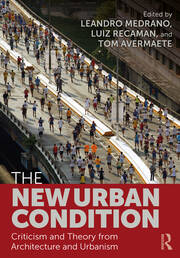 In The New Urban Condition: Criticism and Theory from Architecture and Urbanism (ed. Leandro Medrano, Luiz Recamán, and Tom Avermaete), Daniel contributes with the chapter "The Bubble, the Arrow, and the Area", theorizing how diagrammatic concepts act in and on urban design thinking, including how they affect perceptions and projections of behavior and urban life. The chapter engages with conceptualizations of urbanity and urban design ideals active today, while also investigating how they have been continuously present in both theory and practice for quite some time.
In The New Urban Condition: Criticism and Theory from Architecture and Urbanism (ed. Leandro Medrano, Luiz Recamán, and Tom Avermaete), Daniel contributes with the chapter "The Bubble, the Arrow, and the Area", theorizing how diagrammatic concepts act in and on urban design thinking, including how they affect perceptions and projections of behavior and urban life. The chapter engages with conceptualizations of urbanity and urban design ideals active today, while also investigating how they have been continuously present in both theory and practice for quite some time.
Reports and papers
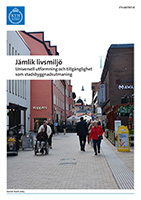
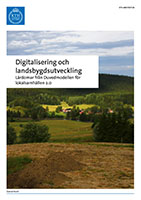 There are also two reports in Swedish (with English summary) that presents the collected knowledge of two recently finished research projects, Equal Living Environments and Duvedmodellen för lokalsamhällen 2.0:"Jämlik livsmiljö: Universell utformning och tillgänglighet som stadsbyggnadsutmaning" and "Digitalisering och landsbygdsutveckling: Lärdomar från Duvedmodellen för lokalsamhällen 2.0", and a co-authored review paper with Dincel et al., "Light formed through urban morphology and different organism groups: First findings from a systematic review.,".
There are also two reports in Swedish (with English summary) that presents the collected knowledge of two recently finished research projects, Equal Living Environments and Duvedmodellen för lokalsamhällen 2.0:"Jämlik livsmiljö: Universell utformning och tillgänglighet som stadsbyggnadsutmaning" and "Digitalisering och landsbygdsutveckling: Lärdomar från Duvedmodellen för lokalsamhällen 2.0", and a co-authored review paper with Dincel et al., "Light formed through urban morphology and different organism groups: First findings from a systematic review.,".
See further publications in the Publication list.
Current Research Projects
Currently, Daniel's research is primarily focused on four projects: within Digital Futures the new project Digitalization, AI and sustainability in cities and sectors, and wrapping up the previous Digitalisation and the public sphere; NorDark, concerning lighting design for multi-species ecologies; DelA – explorative prototypes in cohousing, coliving and beyond, concerning sharing in housing architecture; and a seed grant from Stockholm Stad to develop Transformation typologies, as an increasing challenge for architecture and urban design is how to make best use of existing building stock. The work in Digital Futures builds on previous projects, starting with a project to develop an agenda for Smart Societies research within Digital futures: Towards a Smart Society–the Role of Digital Futures.
Earlier Research Projects
Daniel recently concluded work as researcher in Sensable Stockholm Lab: Urban Segregation and project leader for City Change (projects within Sensable Stockholm Lab, with Stockholm City and MIT), and Architecture and Urbanism, addressing the social space in the 21st century (FAPESP; with FAUUSP, UMA, TU Delft, PC3, Harvard, Universidad Politecnica Madrid).
Before that, he headed the research project Equal living environments: urban design for reduced segregation and increased accessibility (Vinnova, with Uppsala Municipiality, Funktionsrätt Uppsala län and Funktionsrätt Uppsala Kommun), and the digitalisation work package in Duvedmodellen.
Please see the portfolio pages for ongoing research projects and earlier research projects for further information, on current as well as earlier projects, including a full list of projects.
Other earlier academic work
2018-2019 Daniel worked at Chalmers University of Technology, the division of Building Design at Architecture and Civil Engineering, with a commission to develop theory and methods for analysis of buildings. Until 2016 Daniel was Programme Director of the Doctoral education in Architecture at KTH, where he also co-ran courses in Philosophies in Architecture (with Hélène Frichot) and Urban Design (with Lars Marcus). Between 2007 and 2013 he taught at the Stockholm Centre for Fashion Studies at Stockholm University, and between 2007 and 2012 he taught in the Building Management programme at KTH Syd (The planning and building process), now part of KTH ABE.
Contact information
Daniel Koch
KTH Architecture
100 44 Stockholm
daniel.koch@arch.kth.se
+468 790 60 25
Courses
Degree Project in Urban Planning and Design, Second Cycle (AD2EXU), examiner, course responsible
Sustainable Planning and Design (AG2150), teacher
Sustainable Urban Planning and Design Studio 1.1- Textures (AD2867), teacher, course responsible, examiner
Sustainable Urban Planning and Design Studio 1.2- Situations (AD2862), teacher